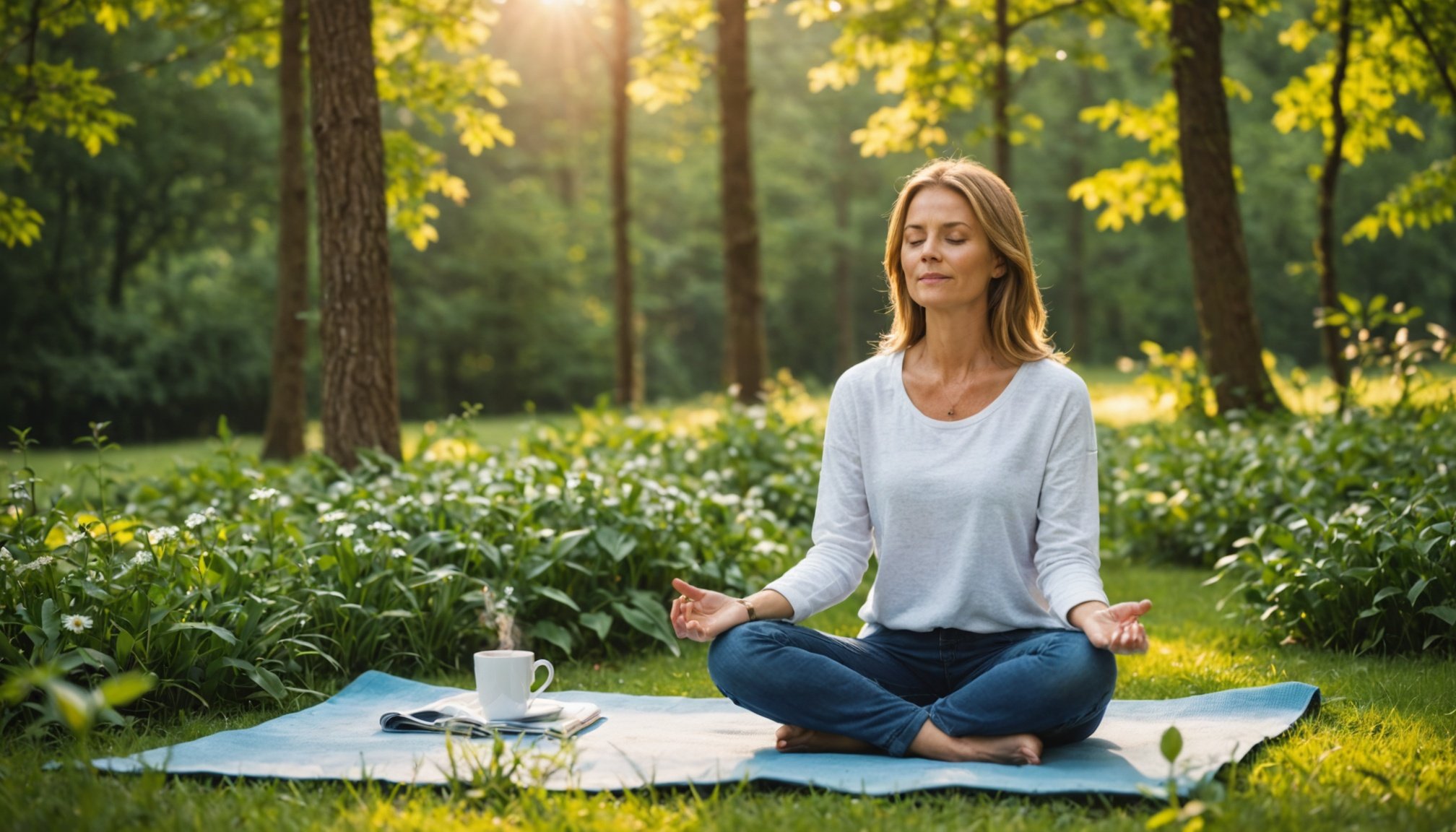Understanding Mindfulness
Mindfulness is the practice of being fully present and engaged in the current moment. It involves paying attention to thoughts, feelings, and sensations without judgment. Originating from Buddhist traditions, mindfulness has evolved into a secular practice, gaining recognition for its stress reduction and emotional well-being benefits. By cultivating awareness, individuals can respond more effectively to daily challenges.
Incorporating mindfulness into daily life can significantly impact one’s ability to reduce stress. Stress often arises from overthinking or projecting into the future, but mindfulness encourages focusing on the now. By doing so, the mind can break free from habitual stressors, fostering a sense of calm and clarity.
Also read : Unveiling the synergy: the impact of biophilic design on employee well-being in the workplace
Emotional well-being is another profound benefit of mindfulness. Regular practice enhances self-awareness, making it easier to identify and manage negative emotions. Over time, this can lead to improved mood regulation and a more positive outlook.
To effectively practice mindfulness for stress reduction, start with small daily sessions. Techniques such as meditation, deep breathing, or simple observation of surroundings can be gradually integrated into routines. This cultivation of presence not only supports emotional well-being but also serves as a powerful tool for enhancing overall life quality.
Benefits of a Blissful Morning Routine
Incorporating a blissful morning routine can significantly enhance one’s daily well-being. Starting the day with mindful activities helps to achieve mental clarity and focus, setting a positive tone for the hours ahead. The integration of structured practices such as meditation or deep breathing can serve as an anchor, promoting emotional health and reducing stress levels.
Establishing consistency in morning rituals is crucial for long-term benefits. Regular routines not only support productivity but also improve mood by infusing each day with a sense of purpose. This orderliness can prevent the chaos of reactive mornings, thereby fostering a more intentional approach to life.
The benefits extend beyond immediate effects, providing a framework for emotional well-being. A thoughtfully curated routine can offer a sanctuary, ensuring that each morning begins with a sense of accomplishment and readiness. Consistency reinforces habits, leading to sustained improvements in overall mental and physical health.
To optimize these benefits, individuals should tailor their morning routine to align with personal preferences and needs. Effective morning rituals are those that resonate, seamlessly integrating self-care into daily life. By doing so, individuals can cultivate a morning routine that not only enhances productivity but supports long-term well-being.
Essential Elements of a Mindful Morning Routine
Incorporating mindful activities into your morning rituals can profoundly impact how you start your day. These activities serve as the cornerstone of establishing a routine that prioritizes self-care and enhances daily focus.
Mindfulness Techniques
Mindfulness techniques, such as meditation and deep breathing, are crucial for fostering mental clarity. Beginning your day with these practices can enhance your ability to maintain focus and reduce anxiety. To incorporate mindfulness effectively, consider setting aside a few quiet moments each morning to practice these techniques, gradually extending the duration over time.
Physical Activities
Including gentle physical activities like stretching or yoga in your morning routine can invigorate both body and mind. These exercises not only energize you for the day ahead but also support mental health by releasing tension and promoting relaxation. Choose activities that resonate with you and adjust them according to your fitness level.
Journaling Practices
Finally, journaling can reinforce mindfulness by allowing reflection and intention-setting. Types of journaling, such as gratitude lists or intention-setting, promote a positive mindset. Establishing a journaling habit can be as simple as writing a few sentences daily, focusing on appreciation or goals for the day. This practice enhances self-awareness and fosters emotional well-being.
Step-by-Step Guide to Creating Your Morning Routine
Creating a personalised morning routine involves understanding your preferences and aligning them with your wellness goals. Starting with a structured template can simplify the process. Begin by listing the mindful activities you wish to include, such as meditation or tea drinking, enhancing both self-care and focus.
Framework for Developing Your Routine
Consider what energises and centers you in the morning. Reflect on previous routines and identify mindfulness practices that filled you with clarity, or physical activities that invigorated you. Outline a basic framework to follow, testing different combinations to find what feels right.
Time Management Tips
Allocating time effectively is crucial when incorporating new morning rituals. Begin with short, manageable segments – perhaps 10 minutes each for meditation and journaling. Gradually extend as you become comfortable. Set alarms or reminders to maintain consistency and avoid rushing.
Example Templates for Inspiration
Experiment with varied templates to discover what suits you best:
- Early Riser Routine: Stretch, meditate, and journal before breakfast.
- Staggered Approach: Meditate post-shower, enjoy breakfast, then journal.
- Activity Rotation: Alternate days focusing on exercise, meditation, or creative outlets.
Adapt these suggestions to create a personalized schedule that supports your daily tranquillity. A thoughtful, consistent morning practice can catalyse profound personal growth.
Success Stories and Testimonials
Delving into real-life testimonials offers rich insights into how mindfulness can transform daily routines and personal outlooks. Many individuals attribute their reduced stress levels and enhanced emotional well-being to consistent mindfulness practices.
Consider Sarah, a tech consultant, who found herself overwhelmed by work-related stress. Incorporating simple morning rituals like meditation and deep breathing led to a notable decline in her anxiety. Her story highlights the profound impact mindfulness can have on stress management.
Another testimonial comes from John, an educator, who revolutionised his mornings with mindful activities. By dedicating time each morning to self-care through journaling and yoga, John experienced marked improvements in his focus and productivity throughout the day. His approach emphasises the tangible benefits of intentional morning rituals.
Such inspirational stories underscore the practicality of mindfulness in everyday life. Hearing from those who have adopted these routines provides valuable insights and encouragement for others seeking personal growth. For those exploring mindfulness, these experiences serve as compelling evidence of the enduring benefits of a thoughtful and consistent morning practice.
Visual Aids and Resources
Incorporating visual aids can enhance your understanding of sustainable mindfulness practices. These resources provide engaging ways to learn and apply techniques in daily life.
Infographics
Infographics offer a clear visual summary of a blissful morning routine. They highlight key statistics on stress reduction and emotional well-being, making it easier to grasp the importance of mindfulness. By breaking data into bite-sized, digestible visuals, they underscore benefits such as improved focus and reduced anxiety. Infographics can serve as daily reminders of your mindfulness journey, assisting in consistently practising these routines.
Guided Videos
Guided videos are valuable resources for accessing structured mindfulness sessions. They allow you to experience guided practices like meditation and deep breathing, enhancing practical understanding and application. Reputable platforms such as meditation apps provide a vast range of sessions, raising awareness of various techniques. Videos also support learning at your own pace, making it easier to integrate these practices into your morning rituals. Visual learning through these videos offers a unique method to deepen your mindfulness practice, fostering a more enriched experience.

